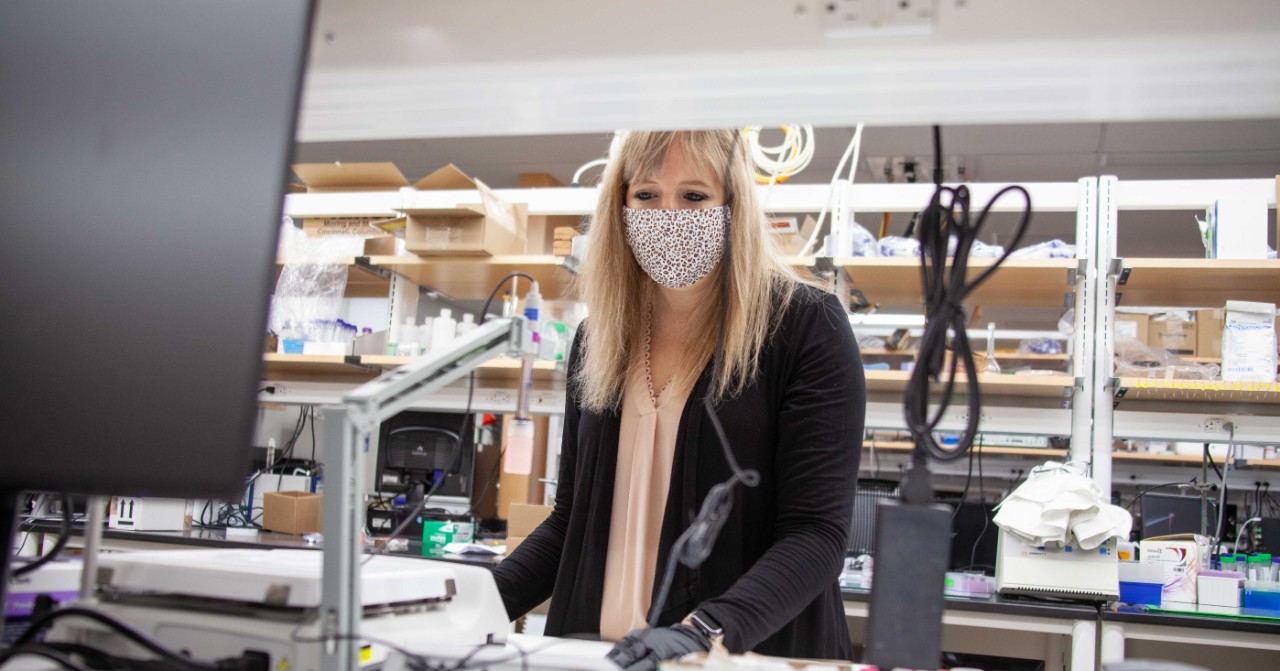
UC researcher named a 2022 Sloan Fellowship recipient
A&S scholar Ashley Ross to further research in neurotransmitters, immune system
University of Cincinnati chemistry researcher Ashley Ross has received a 2022 Sloan Fellowship to continue and expand her study of how the brain communicates to the immune system through neurotransmitters, particularly during inflammatory disease.
Among the most competitive awards in the U.S. and Canada, Sloan Fellowships are awarded annually to recognize creativity, innovation and research accomplishments. Ross is only the fifth UC faculty member to receive the recognition in nearly 70 years.
Former recipients of the fellowship have included mathematician John Nash—one of the fathers of modern game theory and winner of the Nobel Prize in Physics—and for five of the past six years, winners of the Nobel Prize in Physics have included former Sloan fellows.
“Today’s Sloan Research Fellows represent the scientific leaders of tomorrow,” says Adam F. Falk, president of the Alfred P. Sloan Foundation, in a release announcing the winners. “As formidable young scholars, they are already shaping the research agenda in their respective fields—and their trailblazing won’t end here.”
Ross’s lab focuses on developing technologies to measure specific biomolecules, particularly neurotransmitters, which are chemical messengers that are used from the nervous system to communicate to nearby cells not only in the brain, but all throughout the body.
"Understanding this basic biology could potentially lead to better therapeutics in the future...for chronic inflammation."
Ashley Ross Assistant professor of chemistry, 2022 Sloan Fellowship recipient
Specifically, her lab aims to use these tools to study fundamentally how the brain communicates to the immune system and how this communication changes during inflammatory disease.
Ross says she was both shocked and excited to learn she had been selected for the fellowship. “I know how competitive the selection is for this award,” she says, “so it took a moment to really process it.”
She believes the fellowship will significantly impact her research. “Because the fellowship focuses on stimulating fundamental research, the funds for this award enable us to advance knowledge of not only chemical sensing, but of fundamental biological mechanisms,” Ross says. “I think this could greatly improve our ability to extend future collaborations with those in the medical community.”
The real-world implications of Ross’ work will fundamentally advance knowledge of the mechanism and dynamics of how the brain and immune system communicate. This has implications for understanding basic health and inflammatory disease progression in conditions such as Chron’s disease, endometriosis, and rheumatoid arthritis. Through this research, Ross hopes to answer basic biological questions with the tools developed in her lab.
Since 1955, Sloan Fellowships have been awarded to researchers changing the future of seven scientific and technical fields. Sloan Fellowship recipients are nominated by fellow scientists and of more than 1,000 applications, of whom 118 are selected. Winners are awarded a two-year, $75,000 fellowship to advance their research.
Featured image at top: UC assistant professor of chemistry and Sloan Fellowship recipient Ashley Ross in her lab. Photo/Ravenna Rutledge/UC Creative + Brand

By Adrianna Henderson
Graduate Assistant, Marketing and Communication, College of Arts and Sciences
Related Stories
Love it or raze it?
February 20, 2026
An architectural magazine covered the demolition of UC's Crosley Tower.
Discovery Amplified expands research, teaching support across A&S
February 19, 2026
The College of Arts & Sciences is investing in a bold new vision for research, teaching and creative activity through Discovery Amplified. This initiative was launched through the Dean’s Office in August 2024, and is expanding its role as a central hub for scholarly activity and research support within the Arts & Sciences (A&S) community. Designed to serve faculty, students, and staff, the initiative aims to strengthen research productivity, foster collaboration, and enhance teaching innovation. Discovery Amplified was created to help scholars define and pursue academic goals while increasing the reach and impact of A&S research and training programs locally and globally. The unit provides tailored guidance, connects collaborators, and supports strategic partnerships that promote innovation across disciplines.
Niehoff Center for Film & Media Studies kicks off 2026 series
February 16, 2026
The Niehoff Center for Film and Media Studies at the University of Cincinnati invites the campus and community to delve into the thought-provoking “2026 UC European Film Series: Perspectives on Our World.” Five recent films will be screened, with introductions and discussions led by UC faculty. Using a variety of genres and forms, these films encourage audiences to think about their place on the planet, in relation to civic engagement, to the natural world, to others, and even to space aliens in Moravia. “The series is a mix of realism, reality, comedy, and escapism that we hope will make you see things differently,” said Michael Gott, Neihoff Center director of programming and College of Arts and Sciences professor. “Film can make us rethink our ideas about the world and see things from different perspectives.” Past topics have ranged from artificial intelligence to migration, urban spaces, and women in film. Following each screening, discussions with filmmakers and UC faculty aim to spark meaningful conversations.